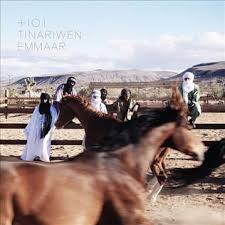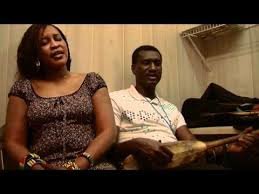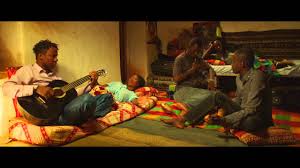Posts Tagged Songhoy Blues
Albums of the decade
Posted by cathannabel in Music on December 30, 2019
Final list of the year/decade end. Honest.
Just ten albums, not ranked in order of importance or merit.
- Arctic Monkeys – AM
- Bjork – Utopia
- David Bowie – Black Star
- Alina Bzhezhinska Quartet – Inspiration
- Nick Cave – Skeleton Tree
- P J Harvey – Let England Shake
- Christian Scott – Ancestral Recall
- Songhoy Blues – Music in Exile
- Tinariwen – Emmaar
- Kamasi Washington – Heaven and Earth
Ten Albums
Posted by cathannabel in Music on May 29, 2018
So, I was challenged to post on Facebook ten albums that have significance, in no particular order. Albums that really made an impact and are still on my rotation list. Post the cover, no need to explain.
Well, I can’t resist this kind of thing. But I do want to explain. So here they are.
NB these are not the ten best albums I’ve ever heard. Not my ten favourite albums. Just ten albums that have somehow or other stayed with me, that I’m always delighted to hear, that led me on to other things, or took me back to somewhere special.
- Steely Dan – Pretzel Logic (1974)
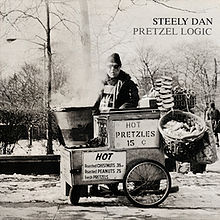 Marshall Hall student residences, Sheffield City College of Education, 1975-77. My first encounter with the Dan, pretty much. And still my favourite ever Dan album. Infused with jazz, explicitly in the Ellington cover, ‘East St Louis Toodle-oo’, and ‘Parker’s Band’, less overtly in the Horace Silver bass pattern on ‘Ricki Don’t Lose that Number’. At the same time, superlative pop/rock, ‘complete musical statements within the narrow borders of the three-minute pop-song format’, according to Rolling Stone. Impenetrable, ambiguous lyrics, which still deliver a hell of a kick. Fave track? ‘Any Major Dude‘.
Marshall Hall student residences, Sheffield City College of Education, 1975-77. My first encounter with the Dan, pretty much. And still my favourite ever Dan album. Infused with jazz, explicitly in the Ellington cover, ‘East St Louis Toodle-oo’, and ‘Parker’s Band’, less overtly in the Horace Silver bass pattern on ‘Ricki Don’t Lose that Number’. At the same time, superlative pop/rock, ‘complete musical statements within the narrow borders of the three-minute pop-song format’, according to Rolling Stone. Impenetrable, ambiguous lyrics, which still deliver a hell of a kick. Fave track? ‘Any Major Dude‘.
Any major dude with half a heart surely will tell you my friend
Any minor world that breaks apart falls together again
When the demon is at your door
In the morning it won’t be there no more
Any major dude will tell you
2. Osibisa (1971)
 Criss-cross rhythms that explode with happiness. For me, hearing this some time in the early 70s was connecting with part of my own past, my childhood in West Africa. Living pretty much on the campus of the Kwame Nkrumah University of Science & Technology, where my father taught, we heard the highlife music wafting over from the student residences. A blend of Latin and African sounds, made for dancing, it was infectious stuff. But I’d forgotten those sounds until Osibisa. They weren’t all Ghanaians but their roots were in a highlife band, The Star Gazers, featuring Teddy Osei (sax), Sol Amarfio (drums) and Mac Tontoh (trumpet) who went on to form Osibisa in London in 1969. Joining them were band members from Grenada, Trinidad, Antigua, Nigeria, and another couple of Ghanaians. It wasn’t ‘authentic’ but then neither was highlife. Music can’t be kept pristine and pure, it is promiscuous, one form instinctively bonding with another to create something new. And it’s portable – the music of Africa crossed the Atlantic on the slave ships and interacted with the music that it found there. Osibisa brought the music of Ghana back to me and today, all these years later, one track especially brings back not just those early years but our family home in Nottinghamshire. Our house was called Akwaaba – ‘welcome’, in Twi which is the official dialect of Kumasi, the capital of the Ashanti region of Ghana.
Criss-cross rhythms that explode with happiness. For me, hearing this some time in the early 70s was connecting with part of my own past, my childhood in West Africa. Living pretty much on the campus of the Kwame Nkrumah University of Science & Technology, where my father taught, we heard the highlife music wafting over from the student residences. A blend of Latin and African sounds, made for dancing, it was infectious stuff. But I’d forgotten those sounds until Osibisa. They weren’t all Ghanaians but their roots were in a highlife band, The Star Gazers, featuring Teddy Osei (sax), Sol Amarfio (drums) and Mac Tontoh (trumpet) who went on to form Osibisa in London in 1969. Joining them were band members from Grenada, Trinidad, Antigua, Nigeria, and another couple of Ghanaians. It wasn’t ‘authentic’ but then neither was highlife. Music can’t be kept pristine and pure, it is promiscuous, one form instinctively bonding with another to create something new. And it’s portable – the music of Africa crossed the Atlantic on the slave ships and interacted with the music that it found there. Osibisa brought the music of Ghana back to me and today, all these years later, one track especially brings back not just those early years but our family home in Nottinghamshire. Our house was called Akwaaba – ‘welcome’, in Twi which is the official dialect of Kumasi, the capital of the Ashanti region of Ghana.
3. Kirsty MacColl – Kite (1989)
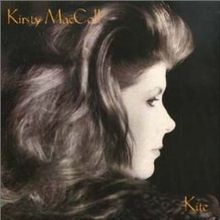 Whenever I post anything about Kirsty I get such an outpouring of love in the comments. From people I knew adored her, and people I had no idea would feel that way. It’s more than the music – we respond to a sense of who she was, that she wasn’t and couldn’t be ‘plastic’. Before Kite I’d heard, obviously, ‘Chip Shop’ and her cover of ‘Days’ and although I’d liked her voice, I wasn’t expecting something this powerful from her. Apart from ‘Days’, there aren’t any covers here, it’s all her. She managed to attract brilliant musicians to work with her – and everyone who did seems to have loved her to bits. Even Morrissey, in all of his petulant and quarrelsome – and lengthy – autobiography doesn’t have a bad word for her. I always loved the story of her making music with Keith Richards and telling him he was playing something wrong. She was tough and vulnerable at the same time, her voice was sweet and strong, her words were funny and heartbreaking. If I have to pick one track from this, it will always be ‘Free World‘.
Whenever I post anything about Kirsty I get such an outpouring of love in the comments. From people I knew adored her, and people I had no idea would feel that way. It’s more than the music – we respond to a sense of who she was, that she wasn’t and couldn’t be ‘plastic’. Before Kite I’d heard, obviously, ‘Chip Shop’ and her cover of ‘Days’ and although I’d liked her voice, I wasn’t expecting something this powerful from her. Apart from ‘Days’, there aren’t any covers here, it’s all her. She managed to attract brilliant musicians to work with her – and everyone who did seems to have loved her to bits. Even Morrissey, in all of his petulant and quarrelsome – and lengthy – autobiography doesn’t have a bad word for her. I always loved the story of her making music with Keith Richards and telling him he was playing something wrong. She was tough and vulnerable at the same time, her voice was sweet and strong, her words were funny and heartbreaking. If I have to pick one track from this, it will always be ‘Free World‘.
4. King Crimson – Red (1974)
 This is seriously heavy. It’s said to be one of Kurt Cobain’s favourite albums, which kind of makes sense. Whilst Crimson are obviously prog, they transcend the stereotypes of the genre, and this album in particular is grungy, particularly on One More Red Nightmare. Crimson was a constantly mutating ensemble, in which the only constant was Robert Fripp. This particular band comprised Fripp on guitar and mellotron, Bill Bruford on drums and Jon Wetton on bass and vocals, plus Crimson alumni David Cross (violin), Mel Collins (soprano sax) and Ian McDonald (alto sax). This was to be the last Crimson album for seven years. Next up was Discipline in 1981, with Fripp (obv) and Bruford plus Adrian Belew and Tony Levin. Top track – ‘Starless‘. It’s bleak and beautiful and kind of terrifying.
This is seriously heavy. It’s said to be one of Kurt Cobain’s favourite albums, which kind of makes sense. Whilst Crimson are obviously prog, they transcend the stereotypes of the genre, and this album in particular is grungy, particularly on One More Red Nightmare. Crimson was a constantly mutating ensemble, in which the only constant was Robert Fripp. This particular band comprised Fripp on guitar and mellotron, Bill Bruford on drums and Jon Wetton on bass and vocals, plus Crimson alumni David Cross (violin), Mel Collins (soprano sax) and Ian McDonald (alto sax). This was to be the last Crimson album for seven years. Next up was Discipline in 1981, with Fripp (obv) and Bruford plus Adrian Belew and Tony Levin. Top track – ‘Starless‘. It’s bleak and beautiful and kind of terrifying.
5. Motown Chartbusters Volume 3
 I bought this for pennies from someone in my class at school. A great big hefty slice of vinyl, already a bit crackly. Packed with classic Motown tunes, by their greatest songwriters (HDH, Whitfield & Strong, Smokey, Marvin, Stevie, Ashford & Simpson amongst others) and their finest artists (Temps, Four Tops, Marvin, Smokey, Stevie, Supremes, Isleys and more). I know and love every note on this album and always will. But in the end there’s one that just floors me every time, Diana Ross & the Supremes – Love Child. This is a classic story song, a story not so far from the real lives of many of the Motown stars, poverty, single parenthood, and the shame of being both poor and illegitimate. Diana may not have been the best singer on Motown’s roster but her voice could burn and yearn nonetheless. Where I lose it is the coda. Diana soars with ‘I will always love you’, whilst the backing singers (apparently not Cindy and Mary on the recording) provide an urgent counterpoint with ‘wait/wait won’t you wait now/hold on/wait/just a little bit longer.’ It’s pretty much damn perfect.
I bought this for pennies from someone in my class at school. A great big hefty slice of vinyl, already a bit crackly. Packed with classic Motown tunes, by their greatest songwriters (HDH, Whitfield & Strong, Smokey, Marvin, Stevie, Ashford & Simpson amongst others) and their finest artists (Temps, Four Tops, Marvin, Smokey, Stevie, Supremes, Isleys and more). I know and love every note on this album and always will. But in the end there’s one that just floors me every time, Diana Ross & the Supremes – Love Child. This is a classic story song, a story not so far from the real lives of many of the Motown stars, poverty, single parenthood, and the shame of being both poor and illegitimate. Diana may not have been the best singer on Motown’s roster but her voice could burn and yearn nonetheless. Where I lose it is the coda. Diana soars with ‘I will always love you’, whilst the backing singers (apparently not Cindy and Mary on the recording) provide an urgent counterpoint with ‘wait/wait won’t you wait now/hold on/wait/just a little bit longer.’ It’s pretty much damn perfect.
6. Flobots – Fight with Tools (2007)
 The first thing I heard from the Flobots was ‘Handlebars’. I can still remember how it affected me, the lyrics and the instrumentation – not just the usual guitar, bass and drums, but viola, cello and trumpet. It gave me goosebumps. In the years when I was running regularly, Flobots were my ideal soundtrack. No matter how tired I was, how daunted by the distance still to go and the steepness of the hill ahead of me, the combination of passionately political lyrics and tight urgent rhythms powered me onwards. There’s always a sense of hope in the words of their songs, a sense that however crappy things are (and lord knows they’ve got crappier since 2007) there is and always will be resistance, people who will man the barricades, who will refuse to shut up.
The first thing I heard from the Flobots was ‘Handlebars’. I can still remember how it affected me, the lyrics and the instrumentation – not just the usual guitar, bass and drums, but viola, cello and trumpet. It gave me goosebumps. In the years when I was running regularly, Flobots were my ideal soundtrack. No matter how tired I was, how daunted by the distance still to go and the steepness of the hill ahead of me, the combination of passionately political lyrics and tight urgent rhythms powered me onwards. There’s always a sense of hope in the words of their songs, a sense that however crappy things are (and lord knows they’ve got crappier since 2007) there is and always will be resistance, people who will man the barricades, who will refuse to shut up.
We are building up a new world
Do not sit idly by
Do not remain neutral
Do not rely on this broadcast, alone
We are only as strong as our signal
There is a war going on for your mind
If you are thinking, you are winning
I’m picking ‘Anne Braden‘. This epitomises their politics, I think. It celebrates a white woman, from the Deep South, who always knew that there was something wrong, and who threw in her lot not with her ‘own people’, but with the oppressed. She was tirelessly active in the civil rights movement and anti-racist politics throughout her life, facing arrest and the constant threat of violence. She believed that there was ‘another America’, and we have to hang on to the belief that she was right.
7. Le Mystere des voix Bulgares (1975)
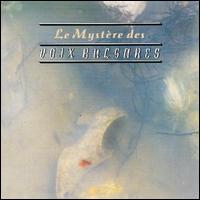
This was originally released in 1975 on a small record label, and might well have been forgotten, had Ivo Watts of 4AD not heard an audio cassette of the recording and tracked it down. It was re-released in 1986 and had a tremendous impact. From the Bulgarian State Television Female Vocal Choir, who contributed the most to the album, the Trio Bulgarka emerged, and worked with Kate Bush on her Sensual World album in 1989. She said that ‘it was something strange to feel this very strong female energy in the studio. It was interesting to see the way the men in the studio reacted… Instead of just one female, there was a very strong female presence.’ What struck me so forcibly when I first heard it was the harmonies. A cappella vocals can always tingle my spine whether it’s The Sixteen doing Allegri’s ‘Misereri’ or The Four Freshmen doing ‘Their Hearts were full of Spring’, but these are not just spinetingling but weird and unsettling. Especially “Sableyalo Mi Agontze” (Заблеяло ми агънце) [The Bleating Lamb].
8. Songhoy Blues – Soubour

I’ve written often about my love for the music of Mali. It’s the birthplace of the blues, and its music never fails to move me, emotionally and physically. These young musicians grew up not only with the astonishing legacy of Malian music – the genius of Salif Keita, Toumani Diabate, Ali Farka Toure – but also the music that had emerged across the Atlantic, Muddy Waters and Jimi Hendrix, inheritors and interpreters of the sounds that generations of Africans had taken with them on the slave ships. Their music has also been shaped by the threat posed by IS affiliates to that incredibly rich culture – see the documentary They will have to kill us first, and Abderrahmane Sissako’s 2014 film, Timbuktu. Hard to pick one track, but for today at least, I’ll pick ‘Petit metier‘.
9. Alice Cooper – School’s Out (1972)

Summer of ’72, my French penfriend, Catherine, was visiting. She brought with her the sound of Claude Francois and Michel Sardou, and went home with singles from Hawkwind and Alice Cooper. I’m somewhat surprised I was allowed over to see her the following year… Not everything that I loved back in the summer of ’72 has stood the test of time, but this one has. And particularly Alice’s appropriation of Leonard Bernstein’s West Side Story in ‘Gutter Cat vs the Jets‘. The Alice image never appealed to me especially, but the music did and does. If I was asked to pick ten musicians Alice would never make the cut (soz Alice) but every time I hear this album I’m reminded of how it galvanised me back then. It also reminds me of the polarisation of music back then. Of my school friends, most listened to Motown, Northern Soul, Ska and reggae. Others listened to Deep Purple, Zep and Alice. I never quite got the hang of which gang I was supposed to be in, because I loved all of the above. Still do.
10. David Bowie – Aladdin Sane (1973)
 Well, obviously there would be Bowie. I could have picked ten albums just from his lifetime’s output. But them’s the rules. Aladdin Sane is an album that surprises me every time I hear it, there are details that I didn’t recall from so many previous listenings. And there’s Mike Garson’s fabulous piano on the title track, amongst others. When Bowie died I reminisced about ‘Time’, and how when we played this album at home we had to ensure we were within arm’s reach of the volume control in case of sudden parental proximity when Bowie got to the v v rude bit of the lyrics. Tough to pick just one track from this album, but I’ve settled on ‘Lady Grinning Soul‘, which is another that features Garson.
Well, obviously there would be Bowie. I could have picked ten albums just from his lifetime’s output. But them’s the rules. Aladdin Sane is an album that surprises me every time I hear it, there are details that I didn’t recall from so many previous listenings. And there’s Mike Garson’s fabulous piano on the title track, amongst others. When Bowie died I reminisced about ‘Time’, and how when we played this album at home we had to ensure we were within arm’s reach of the volume control in case of sudden parental proximity when Bowie got to the v v rude bit of the lyrics. Tough to pick just one track from this album, but I’ve settled on ‘Lady Grinning Soul‘, which is another that features Garson.
Ten albums, from the thousands that have found their way on to our record player/CD player/cassette deck over the years. They’re weighted towards the 1970s, which I guess is inevitable. My teenage years, when my musical tastes were forming, freeing themselves both from parental influence and from the tribalism of my peers, trying things out and finding out what moved my feet, my hips, my mind and my heart. That process has never stopped, but it was at its most intense then. I carry with me the earliest music I heard – a kind of mash-up of the Goldberg Variations with E T Mensah & The Tempos, probably – and there was a gradual immersion in the world of pop and rock when we returned home from West Africa in the late 60s. All of those sounds are still part of my listening world, and I’ve added music from all around the world, and ‘classical’ music that my parents weren’t into (late 20th century stuff, and opera), and jazz and, well, a bit of everything really. And there’s a world of music out there that I don’t know, and that I might love if I get the chance to listen. So ten albums is daft and arbitrary but if you made it 100 albums it still wouldn’t be adequate.
“The world without music? It would be like a prison, right?” (Garba Touré, Songhoy Blues)
Right.
2016 in TV, theatre and music
Posted by cathannabel in Music, Television, Theatre on December 13, 2016
I’m very conscious that I’ve watched very few of the series which are getting the Best Of accolades from the quality press. Some of them are sitting on our BT Vision box waiting to be watched, others we didn’t catch on to until they were underway and so are now waiting for the repeats.
Some of what we did watch was old stuff, the crime series that circulate on the Drama channel or ITV3, of which the best was undoubtedly Foyle’s War, for its meticulous attention to historical detail and the wonderful, understated central performance by Michael Kitchen.
We came late to the Scandi party, having missed The Killing altogether, and caught up with the Bridge only on the most recent series, but did enjoy Follow the Money (financial shenanigans), Blue Eyes (politics and right-wing terrorism), Trapped (murder, human trafficking and a heck of a lot of snow). And whilst we wait for Spiral to return, we saw its late lamented Pierre being an unmitigated shit in Spin.
We enjoyed the latest series of Scott & Bailey, Shetland and Endeavour. But the prize here goes (again) to Line of Duty. Vicky McClure and Keeley Hawes were both formidable and the tension brilliantly ramped up.
The Returned returned. Series 2 was as full of mystery and atmosphere as Series 1 and thankfully did not feel the need to offer tidy solutions. It left loose ends, but in a way that suggested the cyclical nature of events rather than anything that could be resolved by a third series.
Orphan Black’s penultimate series was as always thrilling and funny and complicated, with Tatiana Maslany triumphantly playing multiple roles, with such confidence and subtlety that I still occasionally forget that it’s all just her.
The Walking Dead ended its last season on a horrific cliffhanger, and the opener was pretty grim as well. I have doubts about the series – it is inevitably repetitive: our group finds what looks like a haven, the haven is compromised/invaded, a few of our lot are offed, a few new bods tag along, and on they go to the next apparent haven. The big shift is that as the series have progressed, the greatest danger is no longer from the walkers, since their behaviour is predictable and the survivors have developed effective tactics for defence and despatch, but from other more ruthless survivors. This is interesting territory (the walkers themselves are pretty dull, after all), but I’m not convinced by the way the writers are handling the current storyline. And they’ve shown a worrying tendency to make people act out of character, to do utterly stupid things that they know are utterly stupid, in order to move the story along. So, the jury is out, but I will be watching, whatever.
We also thrilled to The Night Manager, London Spy and Deutschland 83, and to the latest adaptations of War and Peace, and Conrad’s The Secret Agent.
The A Word was wonderful – I know that parents of autistic children had some quibbles, particularly about the way in which children who are ‘on the spectrum’ so often are shown as having special abilities, like Joe with his encyclopaedic knowledge of 80s pop, which is not always the case. But this was the story of one child, and his extended family. The performances were superb, the writing subtle and nuanced, and the image of Joe marching down the road, earphones on, singing ‘World Shut Your Mouth’ or ‘Mardy Bum’, will stay with me for a long time.

Raised by Wolves had a splendid new series, and then was inexplicably and inexcusably cancelled. Still hoping that Caitlin Moran’s crowdfunding project gets sufficient support to bring it back.

Normally my TV of the year would include Doctor Who, but we’ve had a hiatus this year, and will have to wait till Christmas Day for the special, and then 2017 for a new series (and a new companion). Meanwhile there was Class, on BBC3, which got off to a promising start, but as I’ve only seen 3 episodes so far, all comment and judgement is reserved until we’ve caught up.
At the theatre this year we saw two Stage on Screen performances at the Showroom – the Donmar Warehouse production of Liaisons Dangereuses, with Dominic West and Janet McTeer, and Anthony Sher’s magnificent and heartbreaking Lear.
Patrick Stewart and Ian McKellen at the Lyceum Theatre in Pinter’s No Man’s Land were deeply unsettling as well as darkly funny.
And we saw a glorious reimagining of The Duchess of Malfi, transported to West Africa, as Iyalode of Eti.
Opera North at Leeds Grand Theatre – Andrea Chenier, Giordano’s French Revolution tale of loyalty and revenge and love. And a glorious Puccini double bill – Il Tabarro, and Suor Angelica.
Of course there was Tramlines, about which I have rambled euphorically already. There was also Songhoy Blues in a Talking Gig, performing (and talking) after a showing of the remarkable documentary They will have to Kill us First, about the repression of music in Mali by Islamist extremists. Malian music is something else I have rambled euphorically about, and Songhoy Blues in particular.
Two gigs in the Crucible Studio, the first under the auspices of Sheffield Jazz – The Kofi Barnes Aggregation, a collaboration between two splendid, but very different, saxophonists. And the Unthanks were as spinetingly and goosebumpy and lump in the throaty as I could have imagined, whilst being, in person, down to earth and funny and delightful.
Of course the year began with, in the space of just a couple of days, hearing the new CD from a musician whose music has been part of my life since I was a teenager, and then learning of his death. David Bowie is far from being the only important musical figure to pass away this year – indeed, that great gig in the sky is looking pretty crowded now, with Prince, Leonard Cohen, Keith Emerson and Greg Lake, Sharon Jones, Mose Allison, Pete Burns, Prince Buster, Gilli Smyth, Alan Vega, Dave Swarbrick and George Martin, to name but a few, rocking up over the course of the year. But Bowie was the one who meant the most to me.
Desert Island tunes
Posted by cathannabel in Music, Personal on May 19, 2016
Finally, I get to do my Desert Island discs. Kirsty Young appears to have lost my contact details, but no matter, because this year the 24 Hour Inspire featured a pop-up radio station, and I was asked to choose 6 tracks, a book and a luxury, and to talk about them with interviewer Chella Quint.
But how to pick just 6 tracks? It would not, realistically, have been easier if it was the BBC 8. Or even 12, or 20… Not when music has been such a huge part of life, not when it matters so much.
Listening, as I often do, to contributors to Desert Island Discs, I can see a range of different approaches to the task of selection. Some take the biographical approach – linking the tracks explicitly to key points in the life story they are describing. This is interesting, and enriching to the biography, but it may mean that the music doesn’t stand up in its own right, and has purely nostalgic value. Some just pick 8 tracks they kind of like – but you can tell in this case that music is not a passion, not an obsession but a pleasant accompaniment to other things. They have not agonised about those choices, they haven’t felt as though they have personally betrayed the artists who don’t feature in the final cut. That’s fine, but I can’t be like that.
When music really, really matters, the problem is not finding 6 or 8 or however many tracks, it’s finding a rationale for selecting for this particular purpose, on this particular date and time. That’s how I come to terms with it – on another day, in another context, I could and likely would have an entirely different set of tracks. So, what was my approach this time?
First off, I wanted to be able to say something about each track. Not just, this is brilliant, I love this, listen to this bit (although in a normal music-listening context there is a lot of that). But something about why it matters to me, how I encountered it, what it does to me. Secondly, the context. It’s the 24 Hour Inspire, so the music I pick has to be something that moves me, challenges me, disrupts me, inspires me.
Even outside this particular context, I can’t be doing with music that is merely pleasant. It has to move me – that can mean intellectual stimulation (a Bach fugue, for instance, or much of European postwar ‘classical’ music), emotional impact (much sacred music, even though I’m a humanist, and a host of songs that for some reason – lyrics, context, something in the tune, something in the vocals – make me well up or want to punch the air), physical effect (heavy grungy sounds, infectious dancey sounds, music that makes me move my feet, my hips). These are not mutually exclusive categories, of course, as my choices will demonstrate.
TRACK 1: SONGHOY BLUES – SOUBOUR
There had to be music from Mali. Because that’s where so much of the music I love was born – think Muddy Waters, think Hendrix – before it was transported across the oceans on the slave ships, asserted its power as it blended with the folk music and hymn tunes it encountered in the Americas and then made its way back home again.
Songhoy Blues grew up listening to the rich Malian tradition, and griots such as Ali Farka Toure – and to Muddy Waters and Hendrix. You can hear all of this in their music. I’ve written previously about some of the reasons why I feel such a strong emotional connection with West African music, and about the other powerful dynamic in contemporary Malian music – the resistance to the murderous jihadist bigots who invaded the north of the country, and banned football and music, inflicting brutal punishments on those who failed to comply. Songhoy Blues’ sound is joyous, a powerful riposte to the bigots, a reminder that the ‘grey zone’ as they call it is full of colour, full of melody, harmony, rhythm, full of beauty and warmth.
And this year of all years, there had to be Bowie.
TRACK 2: DAVID BOWIE – SUFFRAGETTE CITY
This one goes back to my first encounter with the Star Man, which I wrote about on the day his death was announced. It’s not necessarily my favourite ever track but it’s deeply significant as the start of a relationship that has continued throughout my teenage and adult life, and will continue, despite his death, because all of that music is still there to enjoy and explore.
Crimson were part of my teenage years too.
TRACK 3: KING CRIMSON – RED
I’ve always said that Red was my favourite album from the 70s manifestation of the band, and often said that ‘Starless’ was my favourite track on that album. But for desert island purposes, Starless would be so wrong. It could actually feature in a ‘songs that must never be played during a lonesome, marooned and possibly hopeless sojourn on a desert island’ list. Instead I picked the title track, a grungy heavy instrumental that I always loved, that I remember listening to, drinking cheap cider, sitting on the floor at my boyfriend’s house, and rocking out.
Kirsty MacColl would have to be with me on the island.
TRACK 4: KIRSTY MACCOLL – FREE WORLD
I imagine she’d have been great company in person – certainly the musicians she collaborated with talk about her with enormous affection and warmth, but also respect. She certainly deferred to no one – Johnny Marr tells a lovely story of her taking Keith Richards to task for getting something wrong on the guitar, and Keith accepting it meekly… Kirsty’s songs can be funny, poignant, sharp (sometimes all three), her voice is gorgeous, and she’s one of a number of women in rock/pop music who have managed to make their own rules, to do things their way, against the odds. This song makes me want to punch the air and change the world.
Another voice of rare beauty – actually one of the loveliest voices ever, anywhere:
TRACK 5: SAM COOKE – A CHANGE IS GONNA COME
This song is heavy with the hope and the hopelessness of the early sixties civil rights movement – people holding on to the possibility of change whilst being confronted daily with implacable hostility to change. I think of that – but I also think of the fact that an African-American currently sits in the White House, and for all the injustice and inequality that remains, for all the entrenched prejudice, things can and do change. I would never have believed, twenty years ago, for example, that gay marriage would be legal in so many parts of the world. And for all that there are still so many places where to be gay is to be outside the law and in danger of violence, it happened without that much fuss here, and in other countries, in the end. Even outside the social justice activist world, most people seemed to say, tacitly or otherwise, good on them. I have to remember and have faith that every time things seem hopeless, that a change IS gonna come.
And finally to the least well-known track of my six.
TRACK 6: FLOBOTS – WE ARE WINNING
The Flobots are hard to pin down – the highly political lyrics, spoken and sung, are backed not just with guitars and drums but with viola, cello and trumpet and the effect is intense and powerful. This track is marvellously idealistic, optimistic, hopeful. We are Winning. It doesn’t always (often) feel like it, but it’s something to hold on to, something to keep you keeping on. It speaks to my belief that what we do matters, precisely because this world is all there is. As Joss Whedon put it, in Angel: “If there’s no great glorious end to all this, if nothing we do matters then all that matters is what we do. Cause that’s all there is. What we do. Now. Today.” And there’s a particular pertinence in these lines in the context of an event that celebrates learning, teaching and research: There is a war going on for your mind. If you are thinking, you are winning.
We are building up a new world.
Do not sit idly by.
Do not remain neutral.
Do not rely on this broadcast alone.
We are only as strong as our signal.
There is a war going on for your mind.
If you are thinking, you are winning.
Resistance is victory.
Defeat is impossible.
Your weapons are already in hand.
Reach within you and find the means by which to gain your freedom.
Fight with tools.
Your fate, and that of everyone you know
Depends on it.(Flobots, 2008)
Selecting my six tracks might have been tricky, painful even. I feel I owe a personal apology to so many artists I love but have left out, and if I were to do this again (I ‘m more than willing, guys) I could easily come up with another six, and another, and another…
But these felt good. The 24 Hour Inspire is all about inspiration (obviously), and I feel inspired when I hear these songs. I feel energised, and optimistic, and I want to dance, and to punch the air and change the world. I hope at least some of the songs will affect at least some of you in similar ways. I’ll add the recording of the interview when it’s available. Meantime, enjoy!
https://www.facebook.com/Inspiration-for-Life-340350772727621/
https://mydonate.bt.com/fundraisers/mattmears1
@inspire4L
Mali is Music
Posted by cathannabel in Africa, Music on October 31, 2015
We should probably have been in a courtyard in Bamako, or Segou. Whole families there, kids and the occasional chicken wandering in and out, meals being prepared and eaten, and the music going on into the night, interspersed with talk, and laughter. We were instead in the august surroundings of Firth Hall at the University of Sheffield, sitting in rows listening to Bassekou Kouyate, legendary Malian ngoni player and griot, with his wife Amy Sacko on vocals, in conversation with Andy Morgan.
As the time went on, you could almost hear the thought processes of the audience – ‘what time was that last bus again?’, ‘I’m going to struggle with my 7.00 alarm tomorrow morning’, ‘Can I discreetly text the babysitter to see if she can hold on for another hour?’. So when people started to slip away, they’d already stayed longer than they’d expected to, and they left wishing they could have stayed longer. We managed quite a nifty slip out of the door whilst clapping manoeuvre. A standing and moving sideways ovation perhaps.
Part of the reason we overran was that Bassekou speaks French and Bambara, so Andy had to tell us what he was going to ask him, then ask him in French, then translate Bassekou’s response. And – a tip for the future – don’t ask a Malian griot to ‘just tell us briefly what that song was about’. Whereas a western musician might be able to say, ‘cars and girls’, or ‘the man who done me wrong’, Bassekou’s answers tended to start with, ‘Well, back in the 13th century there was a king called x, in the town of y…’.
But the music – the music was sublime. The ngoni is a stringed instrument, believed to be the origin of the banjo, and possibly the guitar (though of course there are other stringed, plucked instruments that could claim that). In Kouyate’s hands it’s capable of virtuosic cascades of notes, and combined with the compelling rhythm that kicks in after the first few bars, and the warmth (and impressive range) of Amy Sacko’s voice, it’s music that moves the feet and the hips, as well as the heart.
Malian music makes me happier than almost any other music from any time or place. It’s the source of the blues, carried over the oceans by the human cargo of the slave ships, and mutating as it mixed with the other folk musics (and the hymns and psalms) of the various peoples of the Americas, until this black American music out of Africa became the music of a whole generation. And as it did so, of course, it travelled back home again. In Ghana the merging and melding of these musical traditions created the highlife music that I used to hear wafting over from the student residences in the evenings in Kumasi. In Nigeria, juju music and Afrobeat. In Mali, a rich diversity of music, from such fine artists as Salif Keita, Toumani Diabate, Tinariwen, Ali Farka Toure, and the young musicians who form Songhoy Blues.
At the end of the concert, Bassekou Kouyate was asked by a fellow West African about the ‘problem’ of western sounds and musical styles taking over indigenous African music. Kouyate was having none of that. The music is theirs anyway – it’s simply coming home again, having changed a bit over the years, and blended with other sounds. There is a vast repertoire of songs there to be rediscovered, interpreted, shared with the world, and as long as this music is being sung and played, and the traditional instruments are being used alongside the western imports, the music will survive, because it’s strong and beautiful. The threat to this music is not of being ‘polluted’ or drowned out by western sounds. It’s from another source altogether, the fundamentalist Islamist groups that have taken over parts of Mali in recent years and where they have done so they have violently suppressed music – not western music, or secular music, but music.
“The world without music? It would be like a prison, right?” (Garba Touré, Songhoy Blues)
Right.
http://www.theywillhavetokillusfirst.com/
https://cathannabel.wordpress.com/2015/06/21/refugee-blues-refugeescontribute/
http://www.theguardian.com/music/2013/dec/04/songhoy-blues-mali-africa-express
https://www.youtube.com/watch?v=T7Om5HXAB0c
http://www.theguardian.com/film/2015/may/31/timbuktu-mali-isis-review-abderrahmane-sissako
Refugee Blues – #RefugeesContribute
Posted by cathannabel in Film, Music, Refugees on June 21, 2015
One of the glorious by-products of the movements of peoples around the world, however grim the reasons, is the music. Music can cross any barriers, transcend any divisions, no translation required. People driven from their homes make take very little with them, but the songs they grew up with, the music they danced to or played, those weigh nothing. And they enrich the communities in which those people find new homes – music that moves our hearts, our hips, our feet, that comes from places we’ve never seen, with lyrics in languages we don’t speak. Music is vital.
That’s one of the reasons why watching Abderrahmane Sissako’s latest film, Timbuktu, is so intense and so harrowing. The ISIL/Taliban group who have taken over Timbuktu spend their evenings listening out for any sounds of music and silencing it. You could say that there are worse things – this regime does those too, stoning to death a couple accused of adultery. But killing music is a way of killing the soul.
The young musicians who make up Songhoy Blues fled their homes in the north of Mali and since then have been taking their desert blues around the world. They’re doing Glasto next week, but last July at Sheffield’s Tramlines festival I saw them play live and they made me dance, made me smile like an idiot, made me cry a little, when Aliou Toure spoke about his country, his continent, and what the music stood for – peace, love, unity.
http://www.pri.org/stories/2015-03-26/malis-songhoy-blues-are-making-music-exile
http://www.musicfilmweb.com/2014/07/songhoy-blues-mali-music-documentary/




